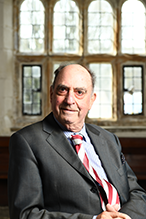- Details
A local government lawyer 1955-1997
 Sir Rodney Brooke CBE DL, who has just published a book on his four decades in local government, looks back on his legal career.
Sir Rodney Brooke CBE DL, who has just published a book on his four decades in local government, looks back on his legal career.
In 1955, when I joined the Morley town hall, top jobs in local government were reserved for solicitors. There was some justification. Until 1972 the courts of quarter sessions were often run by county councils and borough councils. Their clerks required legal knowledge.
Solicitors regarded the top job as theirs by right. So, in 1969, there was outrage among local government lawyers when Coventry City Council appointed an accountant, Derrik Hender, as ‘chief executive’ with authority over the Town Clerk, the council’s lawyer. But when, aged 15, I started in the town hall as an office boy, a legal qualification was obligatory for the head of service in the major local authorities – and even in small local authorities like Morley, with a population of 35,000.
Town Clerks were important people. In the larger cities the incumbents were usually knighted. Even the Town Clerk of a small authority like Rotherham might be knighted if he were felt to be of particular significance. During my local government career I held three posts where my predecessor but one had been knighted.
Even so, the status of town clerks did not compare with the grandeur of the county clerks. In 1913 Sir Harcourt Clare, Clerk of Lancashire County Council fell ill. King George V and Queen Mary stopped at the lodge gates of Sir Harcourt’s residence to enquire as to his health.
In the 1930s the London train would be held at Wakefield station to await the arrival of Sir Charles McGrath, one of my predecessors in the West Riding County Hall. In Warwickshire Sir Edgar Stephens was clerk of the County Council for nearly 50 years. His salary package enabled him to retain the local land charges fees – which amounted to over £100,000 when he retired in 1967 – about £1.5m in 2022 money. The County Clerks were usually also clerks to the lieutenancy and thus a major conduit to honours – including appointments to the magistracy.
I did not aspire to join the number of the great county clerks. But I did want to be a town clerk, which meant that I had to become a solicitor. That required me to be articled to the Town Clerk. He would give me articles only on payment of a premium of 350 guineas (£367.50), then more than the average annual salary of a working man. Fortunately I had started my working life as a reporter on the local paper. So I was able to moonlight as a journalist to raise the necessary money – paid in annual instalments over five years.
During my time in local government local government powers and responsibilities diminished sharply. Local government legal practice in my early career was much more varied than now. Slum clearance and council housing were important preoccupations. Many services – not just responsibility for quarter sessions – have been removed.
During the years after the war slum clearance and council housing were of critical importance in urban authorities, requiring the making of compulsory purchase orders, with the resulting public hearings. Local government solicitors honed their advocacy skills in planning enquiries. Many local authorities ran their own transport operations. In Leicester I was the common law solicitor: running down cases were a major responsibility.
Before 1974 supply of water was a significant function of local authorities. In Morley I had to deal with litigation when a prize boar, Deanwood Pennine Range VIII, escaped when a wall by the council’s reservoir up in the Pennines was demolished by the council’s contractors. The unfortunate pig fell into a midden, where it died a horrid death. In Rochdale I had to field the press when small crustaceans emerged from the taps. In Stockport I had administrative responsibility for the construction of what must have been the last municipal reservoir built before the creation of Water Authorities.
Until the Police Act 1964 even small county boroughs had their own police forces. The local police took guidance from the borough Watch Committee. In Rochdale I prosecuted for riot. In Stockport I was responsible for the last ever reading of the Riot Act – repealed just months after I used it to dissipate an unruly mob whose violence had injured the Deputy Chief Constable.
On local government reorganisation in 1974 I transferred to West Yorkshire County Council. An immediate task was to rationalise the thicket of local legislation. In Huddersfield, for example, householders were required to whitewash their step before 8am or face a fine of five shillings. They were also required to notify the driver before taking a corpse on a bus. Owing to the vagaries of the West Riding legislation, dogs were forbidden to bark at night in Otley, but not in Ossett.
The fire service was an important function, though prominent only after a tragedy. In West Yorkshire I cautioned the Bradford City football club that their stand was a major fire risk. The club ignored my warning. On the day the club won the league and in front of the TV cameras 56 spectators died in the resulting conflagration. Despite my warning to the Club, the County Council was found one-third liable for the deaths.
As chief executive of the West Yorkshire County Council – responsible for the West Yorkshire Police – the Yorkshire Ripper case precipitated me into the spotlight. After their failure to catch the Ripper – thanks to the misidentification of ‘Wearside Jack’ as the Ripper – Home Secretary Willie Whitelaw took a private sounding from me on whether the Police Committee would agree to sack the Chief Constable.
Anomalously the budget for the coroners’ service rested with local authorities. In the West Yorkshire County Council I was faced with ‘the inquest of the century’, when a Yorkshire nurse, Helen Smith, died a violent death in Saudi Arabia during a party. Her father believed that she had been murdered – or died while resisting a sexual assault. Dr Richard Arnott, the host at the party, had been sentenced to thirty lashes by the Saudi authorities for serving alcohol and refused to attend the inquest unless he was represented by a lawyer of his choice. To enable the inquest to take place the County Council agreed to pay for Dr Arnott’s lawyer – out of my budget. His choice was extremely expensive: Sir David Napley, who arrived at the inquest in his golden Rolls Royce. The jury returned an open verdict.
In West Yorkshire my most startling responsibility was as County Emergency Planning Controller for Yorkshire. If nuclear war broke out I was to seek refuge with three councillors in a bunker under the Pennines and emerge to restore democracy after radiation levels had subsided. Body bags were provided so that we could tidy up the corpses.
When abolition of the West Yorkshire County Council was announced, I left to be Chief Executive of the City of Westminster Council. The Council became notorious during the leadership of Dame Shirley Porter, who became famous for selling three council cemeteries for 15p – despite my advice. She became even more notorious when she started the ‘Homes for Votes’ scandal and was surcharged £42.5m. Fortunately I had the good sense to resign before that happened. My resignation was front page news in the national press for three days. Cameramen camped on the lawn of my house. We had to keep the curtain drawn until the hubbub subsided. My 14-year-old son was interviewed on his way to school.
After Westminster I joined the Association of Metropolitan Authorities, one of the three local government representative bodies which merged to form the Local Government Association – where my local government career ended. But while it lasted I managed to pick up a CBE, a knighthood and honours from five other countries.
I tell the story of my forty years in local government in my book The Winding Stair (ISBN1838489975).
Photo: SWpix.com
Commercial Lawyer
Solicitor - Civil and Criminal Litigation
Child Care Lawyer
Head of Legal
Litgation Solicitor
Solicitor - Contracts and Procurement
Legal Director - Government and Public Sector
Solicitor - Civil and Criminal Litigation
Locum roles
 Cornerstone Barristers roundtable on the Draft NPPF: Plan-Making Provisions
Cornerstone Barristers roundtable on the Draft NPPF: Plan-Making Provisions
09-02-2026 2:00 pm
London
 Breakfast Briefing – Commonhold & Leasehold Reform Bill – a session focusing on the key themes of the Bill and the Consultation on Banning Leasehold for New Flats - Devonshires
Breakfast Briefing – Commonhold & Leasehold Reform Bill – a session focusing on the key themes of the Bill and the Consultation on Banning Leasehold for New Flats - Devonshires
12-02-2026 8:30 am
London
 Planning, Property and Power Webinar Series: Strategic energy planning - Landmark Chambers
Planning, Property and Power Webinar Series: Strategic energy planning - Landmark Chambers
12-02-2026 10:00 am
Online (live)
 Public Sector Insights – NHS Continuing Healthcare (CHC) in Wales - Blake Morgan
Public Sector Insights – NHS Continuing Healthcare (CHC) in Wales - Blake Morgan
12-02-2026 10:00 am
Online (live)
 InLaws workshop – Effective Communicating and Influencing - Devonshires
InLaws workshop – Effective Communicating and Influencing - Devonshires
12-02-2026 2:00 pm
Online (live)
 HMPL Building Blocks: Legal Tools to Combat Anti-Social Behaviour - Devonshires
HMPL Building Blocks: Legal Tools to Combat Anti-Social Behaviour - Devonshires
17-02-2026
Online (live)
 Data Controller, Processor or Joint Controller: What am I? - Act Now
Data Controller, Processor or Joint Controller: What am I? - Act Now
18-02-2026 10:00 am
Online (live)
 Freedom of thought, belief and religion: Article 9 ECHR - Francis Taylor Building
Freedom of thought, belief and religion: Article 9 ECHR - Francis Taylor Building
19-02-2026
Online (live)
 AI and Information Governance: Bridging Innovation and Compliance - Act Now
AI and Information Governance: Bridging Innovation and Compliance - Act Now
19-02-2026 10:00 am
Online (live)
 Safeguarding Issues and Fairness in Investigations and Hearings - 3PB
Safeguarding Issues and Fairness in Investigations and Hearings - 3PB
24-02-2026 11:00 am
Online (live)
 Children and Young People (DoL, Competency and Capacity) - Peter Edwards Law Training
Children and Young People (DoL, Competency and Capacity) - Peter Edwards Law Training
25-02-2026
Online (live)
























































































































 The General Data Protection Regulation - Act Now
The General Data Protection Regulation - Act Now  Interveners in financial remedy proceedings - 42BR
Interveners in financial remedy proceedings - 42BR  The Procurement Act - One Year On - DWF
The Procurement Act - One Year On - DWF  The ERA – An Overview - Sharpe Pritchard
The ERA – An Overview - Sharpe Pritchard  Short Term Lets - Ivy Legal
Short Term Lets - Ivy Legal 